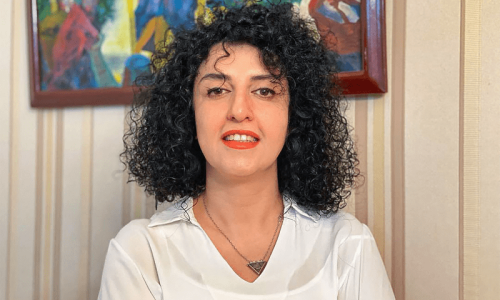The Islamabad High Court stressed on Thursday that arguments on the admissibility of the petition seeking former prime minister Imran Khan’s disqualification for concealing his alleged daughter Tyrian White in his nomination forms submitted to contest the 2018 general election were very important.
The observation was made by IHC Chief Justice Aamer Farooq after a larger bench comprising him, Justice Mohsin Akhtar Kayani and Justice Arbab Mohammad Tahir took up the plea earlier today.
Last year, petitioner Sajid Mahmood had approached the court claiming that although Imran made arrangements for Tyrian White’s upkeep abroad, he did not disclose it in nomination papers and affidavits filed by him for elections.
Salman Butt was present from the petitioner’s side while Imran’s counsels included Advocate Salman Akram Raja’s assistant and Advocate Salman Abuzar Niazi.
At the outset of today’s hearing, the petitioner’s lawyer sought permission to submit new documents pertaining to the case in court i.e. the notification regarding Imran Khan’s victory on seven National Assembly seats recently issued by the Election Commission of Pakistan (ECP).
The bench accepted the request and instructed Butt to provide a copy of the new documents to Imran’s lawyers.
The judge then asked the lawyers of both sides to present their arguments one by one. “One side is saying that Imran is a member of the National Assembly while the other side is saying that he is not.”
Here, Butt recalled that at the previous hearing, the court had sought comments from the ECP over the matter.
For his part, Imran’s lawyer Raja said that he needed more time to prepare the response to the new documents. However, Butt interjected that “delaying tactics” were being used in the case.
At that, Justice Farooq observed: “In Faisal Vawda’s case, it took them more than a year to submit the response. By the time his reply came, Vawda was no longer a member of the National Assembly.”
Meanwhile, Raja said that he would present arguments on the admissibility of the petition.
“I don’t know what is the hurry. The court has itself sought arguments on the admissibility of the plea,” he stated and requested the court for time to submit his responses.
On the other hand, ECP’s lawyer maintained that if the petitioner challenged the commission’s notification [on Imran’s victory on seven NA seats], then the electoral body would submit a response.
Here, the court remarked that arguments on the admissibility of the plea were very important. It directed the ECP to submit “verified documents” on Imran’s victory and asked the PTI chief’s lawyer to present his response in court at the next hearing.
Subsequently, the case was adjourned till March 1.
Imran argues petition ‘not maintainable’
In a response submitted on the petition in IHC last week, Imran had requested the court to dismiss the petition saying that it was “not maintainable” on legal grounds.
The PTI chairman had argued that he was not a member of the National Assembly anymore, therefore such a petition was “not maintainable and may not be proceeded (sic)”.
Imran had stated that his resignation from the National Assembly “is irrevocable and he has no intention of taking up a seat in the present National Assembly”.
He had argued that the IHC could not examine the “veracity or otherwise of any declaration or affidavit issued” in the exercise of its constitutional jurisdiction, especially with respect to a person who had ceased to hold public office.
“Such examination requires the leading of evidence, examination and cross examination of witnesses in a course of a trial before a competent forum.”
The ex-premier had also referred to similar petitions filed in the IHC and Supreme Court previously that were dismissed on the same grounds.
He had added that a case considered once before to be “improper to proceed with” could not be taken up again as per the law.
The petition
Mahmood, the petitioner, had alleged that the PTI chairman did not marry Sita White because her “racist father categorically told the respondent (Imran) that if he married Sita, they would not get a penny of his money”.
“Only thereafter, he met Jemima, another rich lady, and in a very short time married her.”
The petition, titled “Imran versus Imran — the untold story”, recalled the circumstances in which the custody of Tyrian Jade was given to Jemima.
It stated that Ana-Luisa White, in her will of Feb 27, 2004, had nominated Jemima Khan as guardian of her daughter Tyrian Jade Khan-White. Sita White died that year on May 13.
The petition went on to state: “Jemima Goldsmith had been the spouse of Imran Khan (1995-2004).
“The concealed facts stood confirmed by a judgement of paternity rendered by a superior court in California in favour of Sita White where it was held that the respondent (Imran Khan) was the father of Tyrian Jade.”
Imran Khan initially joined the proceedings through his attorney, but defaulted after he was asked to undergo a blood test, it added.
However, he later submitted a declaration to a court of guardianship when Caroline White, Sita’s sister, asked the court that she be appointed Tyrian’s guardian, the petition alleged.















































Dear visitor, the comments section is undergoing an overhaul and will return soon.